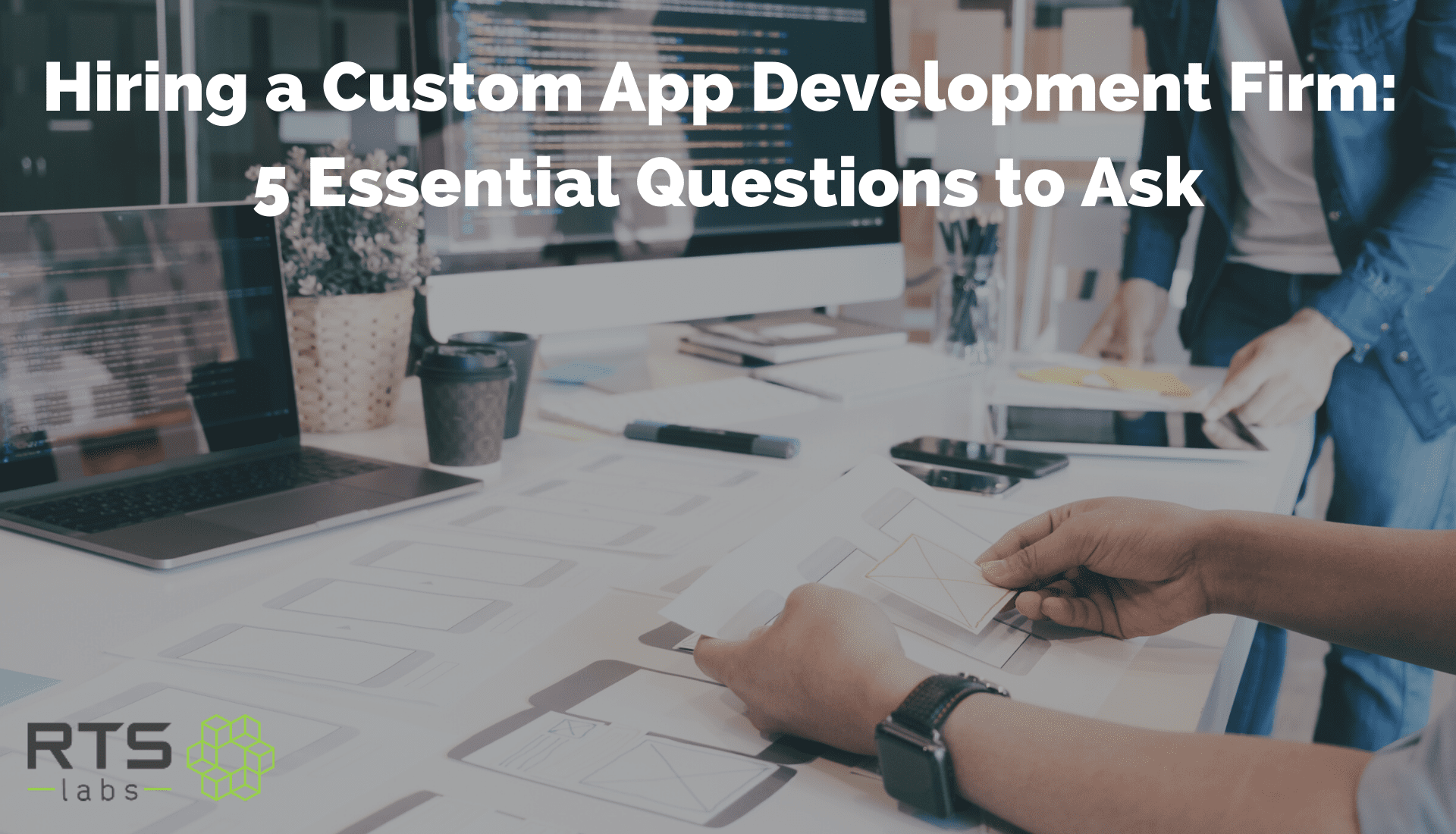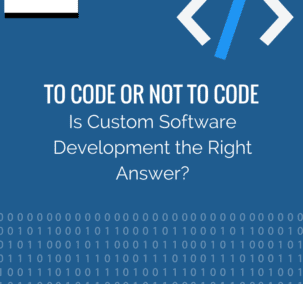5 Key Questions for Hiring a Custom App Developer

Choose the right custom app development partner by asking smart questions about critical parts of your custom app project.
Software seems to exist everywhere and control everything.
The six largest companies in the world are all tech companies with enormous user bases. Most of the world’s businesses probably use applications developed by one or more of these six companies. But many businesses have learned that existing software solutions aren’t always enough to solve their unique problems.
If your company can’t get things done with an existing app, you might want to consider hiring a custom application development firm. Easier said than done, though. There are thousands of custom app development companies around the world. Most of them simply don’t have the right combination of skills, experience, and industry knowledge to solve your particular problem. To select the right app development partner, you’ll need to know what you need before starting your project. You’ll also need to ask the right questions to narrow the field and uncover the strongest candidates.
In this article, we’ll take a look at five great questions to ask a custom app developer. You should consider them good starting points rather than a comprehensive checklist of requirements. Every custom app has certain unique demands, and every business that needs custom app development is likely to approach the project in its own unique way.
1. What prior work have you done on similar projects?
You wouldn’t hire a plumber to fix an electrical problem. You probably wouldn’t hire a plumber who’s only done residential repairs to lay pipe for an industrial warehouse, either.
Any developer you work with should have a track record of success building applications providing similar functions as those you need. Ideally, that developer should also have experience working with similar businesses of similar sizes.
You might think a lower bid is a better bargain, but price alone is never the whole picture. Newer app development shops are often cheaper than established firms because they haven’t yet proven their value by delivering successful solutions.
A custom app developer that’s been in the trenches before is more likely to know how to avoid problems, streamline processes, and provide solutions that make sense for you.
Reputable app development companies should have a range of testimonials, success stories, case studies, and portfolio examples on their website.
While it’s not always possible to see live examples of a development firm’s custom apps due to NDAs or other contract restrictions, testimonials and case studies can still provide great insight into your prospective developer’s track record. It’s a red flag if your prospective developer doesn’t have any public testimonials and/or case studies on their site, or can’t provide any when asked.
RTS Labs’ “Our Work” page has a dozen detailed testimonial videos from happy customers, and we’ll gladly send case studies to demonstrate our expertise with any sort of app development project you’re pursuing.
2. What platform(s) should this app be developed for, and why?
You might think you need a mobile ecommerce app, or a cloud-based employee portal, or a supply chain management system customized to run on your warehouse’s existing hardware. But there’s a big difference between knowing what you need and understanding how it should be implemented.
Working with an experienced custom app developer can help you hone your project’s focus so you’re not just throwing code at the wall until something sticks.
Discussing your problems with any prospective developer should result in a clear understanding of the solution. This includes not only an understanding of what platform(s) your custom app will run on — browser-based, mobile app, integrated with other systems, etc. — but also what languages will be used, and how much flexibility you and your team will have to customize the finished app once it’s delivered.
Many modern custom apps are designed to run on multiple platforms, but this isn’t always necessary or desirable. An experienced development firm should be able to explain what platforms your app will run on, what programming languages will drive it, and why they’ve chosen to develop on those particular platforms in those languages.
3. What does your project management process look like?
Good working relationships are built on consistent communication. Well-developed project management processes give businesses the means to maintain that consistency.
You don’t need to know everything about what your prospective developer will do internally, but you should know how they plan to keep you in the loop.
Modern app development tends to be agile and iterative, with plenty of opportunities for you and your team to test pre-launch builds before your app goes live. Your prospective developer should have a communication schedule for regular updates, a defined point of contact (typically a project or account manager) for both regular updates and urgent requests, and be able to provide access to any necessary project management tools.
Your prospective app developer should also be able to lay out boundaries so both parties understand what’s possible with the available time and resources. You might not like being told “no,” but sometimes a request simply isn’t feasible or sensible for your project. Experienced developers know what they can accommodate, and what they need to push back on.
4. What are your estimates for this project’s timeline and cost?
Two of the most important questions to ask for any custom app development project are: “How long will it take?” and “How much will it cost?”
You probably have an idea of how much you can afford to spend, and how long you can afford to wait before launching your custom app. An experienced developer should be able to understand your needs and goals well enough to project reasonably accurate timelines and provide an all-in price for the services you need.
Timelines and budgets can (and often do) change as the project evolves. However, if you go in with a clear idea of what it’ll take to complete, you’ll probably be much more satisfied with its outcome. Any cost estimates should also include potential overruns and optional services, so you can decide if it’s worth building out all the bells and whistles you’ve imagined.
5. What will your involvement be after you launch our app?
A custom app doesn’t exist in a vacuum. Most applications interact with many other applications, and are used by many different stakeholders, on a regular basis. That creates a lot of potential points of failure — and everyone who’s built technology knows that everything will break eventually.
Will your custom app development partner be there to help you fix things when something breaks? Will they provide ongoing support and maintenance? Will they help you update the app with new or improved functionality? What will your developer do, after they launch your app, to keep it running smoothly?
Any contract proposal should specify the scope of your developer’s post-launch involvement, just as it should specify the scope of the development project itself. The last thing you need is for your custom app to crash a month or two after launch, when no one’s willing or able to help you fix it. If your developer won’t support their app after its launch, they should at least be able to point you towards someone who will.
Any more questions?
You don’t have to stop with these questions. A custom app is a significant undertaking for most companies, and you shouldn’t choose your developer lightly.
At RTS Labs, we’re always happy to answer any questions you might have about developing a custom application for your business’ needs. We want you to be an informed and engaged partner in the development process. Want to learn more about developing a custom app? Get in touch with us today!
